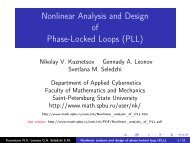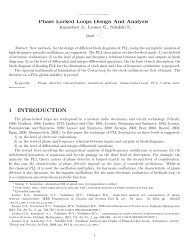Technical Sessions – Monday July 11
Technical Sessions – Monday July 11
Technical Sessions – Monday July 11
Create successful ePaper yourself
Turn your PDF publications into a flip-book with our unique Google optimized e-Paper software.
TD-14 IFORS 20<strong>11</strong> - Melbourne<br />
Mawson Lakes, South Australia, Australia,<br />
asef.nazari@unisa.edu.au<br />
The increasing utilization of electricity generated by wind farms in a power<br />
system requires a careful expansion policy for the existing grid. The transmission<br />
expansion planning incorporating uncertainties in load and wind generation<br />
leads to a complex stochastic mixed integer programming problem. The<br />
Cross Entropy method shows promise in solving global optimization problems<br />
regardless of continuity or other assumptions. In this adaptation of the method<br />
to stochastic cases, we sample integer variables using the CE mechanism, and<br />
solve stochastic LPs to obtain matching continuous variables.<br />
2 - Cointegration of Wind Energy from South Australian<br />
Windfarms<br />
Manju Agrawal, Mathematics and Statistics, University of South<br />
Australia, School of Mathematics and Statistics, Mawson Lakes,<br />
5095, Adelaide, South Australia, Australia,<br />
manju.agrawal@unisa.edu.au, John Boland<br />
Volatility of wind energy is a challenge to effecient operation of an electricity<br />
grid. We analyse concurrent data of South Australian wind-farms’ output. Engle<br />
and Granger (1987) demonstrate the importance of cointegration in general<br />
and we apply this concept in the context of Australian windfarms, in particular.<br />
3 - The Ecological Factor in Optimization Models<br />
Marija Cileg, Quantitative Methods in Economy, Faculty of<br />
Economics, Segedinski put 9-<strong>11</strong>, 24000, Subotica, Serbia,<br />
macileg@yahoo.com, Tibor Kis<br />
The main objective of this paper is to investigate modes of quantifying and<br />
optimizing ecological factors, analyzing this problem from the standpoint of<br />
companies. In the paper we propose a particular method of comparing additional<br />
costs for environment protection and repayments received by companies<br />
that has high importance for the overall profitability. To investigate and solve<br />
the described problem we apply a programming model with fractional objective<br />
function along with appropriate sensitivity analysis. Separate analysis is<br />
devoted to system of limits and to objective function.<br />
4 - Lebesgue Integral Inspired Estimation of 5 Minute Wind<br />
Energy Output<br />
Barbara Ridley, Barbara Hardy Institute, University of South<br />
Australia, School of Mathematics and Statistics, Mawson Lakes,<br />
5095, Adelaide, South Australia, Australia,<br />
barbara.ridley@unisa.edu.au, Jerzy Filar, John Boland<br />
We are investigating the behaviour of total energy output from wind farms using<br />
a Lebesgue integral inspired aggregation of contributions from different energy<br />
bands. This procedure will identify the length of duration of events and also<br />
the waiting time between those events. Our goal is to mathematically model<br />
these processes to forecast the energy from wind farms so that their output can<br />
be reliably estimated in order to enter fully into the competitive electricity market.<br />
Our research is utilising 5 minute data which is the most important time<br />
interval for the Australian electricity market.<br />
� TD-14<br />
Tuesday, 17:00-18:30<br />
Meeting Room 207<br />
Optimization Methods and Stochastic<br />
Calculus in the Financial Sector I<br />
Stream: Continuous and Non-Smooth Optimization<br />
Invited session<br />
Chair: Miroslav Culik, Finance, VSB-TUO, Sokolska tr. 33, 70121,<br />
Ostrava, Czech Republic, miroslav.culik@vsb.cz<br />
Chair: Leonidas Sakalauskas, Operational Research, Institute of<br />
Mathematics & Informatics, Akademijos 4, LT-08663, Vilnius,<br />
Lithuania, sakal@ktl.mii.lt<br />
1 - Option Pricing via Monte Carlo Simulation with Fuzzy<br />
Parameters<br />
64<br />
Tomás Tichý, Department of Finance, Faculty of Economics,<br />
VSB-<strong>Technical</strong> University Ostrava, Sokolská 33, 701 21,<br />
Ostrava, Czech Republic, tomas.tichy@vsb.cz, Michal Holcapek<br />
During last decades the stochastic simulation approach, both via MC and QMC<br />
has been vastly applied and subsequently analyzed in almost all branches of<br />
science. Since financial quantities, opposed to natural processes, depends on<br />
human activity, their modeling is often very challenging. Many scholars therefore<br />
suggest to specify some parts of financial models by means of fuzzy set<br />
theory. In this contribution the recent knowledge of fuzzy numbers and their<br />
approximation is utilized in order to suggest fuzzy-MC simulation to option<br />
price modeling in terms of fuzzy-random variables.<br />
2 - On the Number of Explanatory Variables of Corporate<br />
Rating Method with Artificial Neural Network<br />
Katsuaki Tanaka, Faculty of Business Administration, Setsunan<br />
University, 17-8 Ikedanakamachi, 572-8508, Neyagawa, Osaka,<br />
Japan, k-tanaka@kjo.setsunan.ac.jp, Hideki Katsuda<br />
Our research objective is to simulate the corporate ratings by rating agency<br />
only with quantitative data using artificial neural networks. The details of rating<br />
agency’s procedure are not disclosed. In rating process, they use not only<br />
quantitative variables in financial statements but also qualitative information<br />
about the company. When we simulate ratings, we have used 12 variables. In<br />
this paper, we delete some variables with low contribution and decide the number<br />
of enough variables based on five years data.Our contribution is to show the<br />
way of reducing a cost burden to get data.<br />
3 - The Stability Investigation of the Three Large Czech<br />
Banks within Z - Metrics Methodology<br />
Petr Gurný, Department of Finance, VSB -TU Ostrava, Sokolska<br />
tr. 33, 70121, Ostrava, Czech Republic, petr.gurny@vsb.cz<br />
The paper is devoted to the investigation of the Czech banks health, which we<br />
can regard as one of the most important tasks in the time of the financial crisis.<br />
The main goal of the paper is an estimation of the future probability of default<br />
(PD) for three key Czech banks. At first the model (built on the basis of the<br />
Z-metrics methodology) for prediction of bank failure will be presented. Afterwards<br />
the relevant financial indicators needed for estimation of the future PD<br />
will be simulated via Lévy processes and their dependencies will be captured<br />
via gaussian copula function.<br />
4 - Cash Management by Two-stage Stochastic Programming<br />
Leonidas Sakalauskas, Operational Research, Institute of<br />
Mathematics & Informatics, Akademijos 4, LT-08663, Vilnius,<br />
Lithuania, sakal@ktl.mii.lt<br />
Problems of cash management are analyzed, that often arise in public, nonprofit-making<br />
or business institutions. Stochastic linear programming formulation<br />
of a firm’s short term financial planning problem is presented using twostage<br />
stochastic model. Two-stage stochastic problems are solved by series of<br />
Monte-Carlo estimators ensuring the solution with admissible accuracy. The<br />
method developed is realized in C++ programming language. Several cases of<br />
application of financial options are investigated.<br />
� TD-15<br />
Tuesday, 17:00-18:30<br />
Meeting Room 208<br />
Holistic Approaches to Military and Security<br />
Modeling<br />
Stream: Military, Defense and Security Applications<br />
Invited session<br />
Chair: Justin Millikan, DSTO Australia, Australia,<br />
justin.millikan@dsto.defence.gov.au<br />
1 - A Study of Issues Involved in using an Explicit Cognitive<br />
Model within an Agent-Based-Model Crowd Scenario<br />
Wayne Johnson, Land Operations Division, Defence Science &<br />
Technology Organisation, 5<strong>11</strong>1, Edinburgh, SA, Australia,<br />
wayne.johnson@dsto.defence.gov.au, Philip Jacques, Martin<br />
Wong<br />
We investigate the feasibility of including simple rule based cognitive models<br />
within Agent-Based-Models (ABMs) in general and the Societal-centric Interactions<br />
Model (ScIMs) project in particular. It will extend an existing published<br />
sociological crowd riot scenario of Jager et al. (2001), in which agents currently<br />
only have a single dimension, aggression-motivation, as a cognitive representation.<br />
The extended cognitive model includes other emotional dimensions to<br />
create a richer emotion, motivation model.




